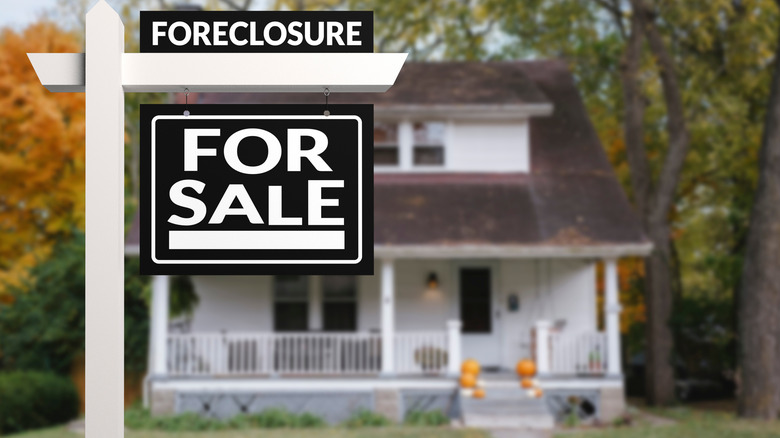How A Home Foreclosure Can Affect Your Taxes In 2023
With 2023 seeing a spike in home foreclosures during the current housing market's unstable conditions, it's essential to understand the tax obligations that come with the bank repossessing your home. Many people may be unaware that a foreclosure doesn't necessarily mean you can walk away with no obligations but that you could be on the hook for other financial reasons, like taxes. Foreclosures happen due to varying causes, from simply defaulting on your mortgage to not paying your property taxes. ATTOM's Year-end 2022 United States Foreclosure Market Report found that 324,237 properties experienced default notices or foreclosures in 2022, a 115% increase from 2021 but a 34% decrease from 2019.
"When a mortgage, or any other debt for that matter, is forgiven, IRS considers the relief from that debt as 'phantom income,'" attorney and real estate professional Bruce Ailion told Realtor.com. "And phantom income is taxed as if it were ordinary income, as if you received income to pay off the loan." As a result, your forgiven mortgage may be sent as a 1099-C form and be federally taxed. However, there are ways to avoid being responsible for those taxes.
Mortgage debt relief
Right before 2008's recession and housing collapse, the Mortgage Debt Relief Act was passed in 2007 and has since evolved into the Consolidated Appropriations Act, which allows someone to exclude their forgiven mortgage from their income taxes as long as the house was their primary residence, and the debt was under $750,000 for those filing jointly. "And there will be no taxable income from the cancellation of debt, per the Consolidated Appropriation Act (CAA), which was signed into law in December 2020 and has extended the exclusion of canceled qualified mortgage debt from income for the tax years 2021 through 2025," Associate Professor of Accounting Lei Han said, per Realtor.com.
Those who acquired a home equity loan or a home equity line of credit before experiencing a foreclosure may also have their forgiven debt labeled as taxable income. However, you could qualify for an exemption if the loans were used to upgrade the living conditions of your primary residence. Another situation that won't see taxation is any canceled debt resulting from bankruptcy. Furthermore, if you cannot pay your debts prior to foreclosure and your debt is greater than the sum total of your assets in addition to your house, you could disbar a forgiven mortgage from income tax up to the total amount indebted. Whatever your situation may be, it's best to conduct the proper research and ensure you understand your financial obligations to the fullest extent to take advantage of all tax breaks and reliefs offered.

